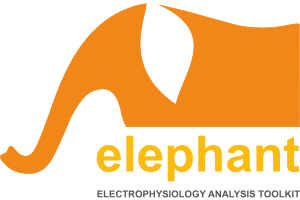Elephant Tutorials
Elephant Tutorial Space
Interactive video tutorials on
neuronal data analysis using Elephant
Upcoming training events
A resource for kick-starting work with the Elephant library
The Python library Electrophysiology Analysis Toolkit (Elephant) provides tools for the analysis of neuronal activity data, such as spike trains, local field potentials and intracellular data. In addition to providing a platform for sharing analysis codes from different laboratories, Elephant provides a consistent and homogeneous framework for data analysis, built on a modular foundation. The underlying data model is the Neo library, a framework which easily captures a wide range of neuronal data types and methods, including dozens of file formats and network simulation tools. A common data description, as provided by the Neo library, is essential for developing interoperable analysis workflows.
In this collaborative space, we provide hands on video tutorials based on Jupyter notebooks that showcase various types of data analysis, from simple to advanced. Most notebooks are based on a common dataset published at https://gin.g-node.org/INT/multielectrode_grasp (for details cf. Brochier et al (2018) Scientific Data 5, 180055. https://doi.org/10.1038/sdata.2018.55). All video tutorials are approximately 30 minutes in length.
In addition, tutorials presented at various workshops and schools are collected in this collab.
Access to the tutorials
To access the tutorials, check out the drive space of this collab. The Jupyter notebooks are available in the notebooks folder, and links to the videos are embedded within each notebook. Notebooks can either be run directly on the EBRAINS Collaboratory's JupyterLab service (currently limited to HBP-affiliated members), or downloaded and run locally. For local execution, please use the provided requirements.txt file to generate an appropriate Python environment.
Execution on the EBRAINS Collaboratory
- Open the EBRAINS lab by selecting the corresponding Lab menu entry on the left.
- In the lab, navigate to a particular notebook and open and execute it.
- Please note that in some instances, you may need to restart the kernel for the notebooks to run (e.g., when new packages are installed by the notebook, or in case of low memory).
- To save changes you may want to make to a notebook, please create a copy of the notebook in a collab of your own (i.e., a collab where you have write permissions).
Local execution
- Open the EBRAINS drive by selecting the corresponding Drive menu entry on the left.
- Download a particular notebook, the datasets, and the requirements.txt to your computer.
- Create a Python environment based on the requirements.txt file. The details will depend on your particular Python setup.
- Likely, path names to data files must be adjusted accordingly.
List of available tutorials
| Tutorial | Hosts and Authors | Content |
|---|---|---|
| LFP_analysis | Robin Gutzen | Apply basic LFP analysis techniques, such as power spectra. |
| Spike_analysis | Cristiano Köhler | Perform basic statistical analysis of spike trains from rate profiles to pair-wise correlations. |
| Spatio-temporal_spike_patterns | Regimatas Jurkus Alessandra Stella | Highlights two methods for detecting hidden spatio-temporal patterns in spike data. |
| GPFA | Simon Essink | Extract low-dimensional rate trajectories from the population spike activity. |
| Surrogate_techniques | Peter Bouss | Learn how to use different surrogate methods for spike trains to assist in formulating statistical null hypotheses in the presence of non-stationarity. |
| NEST-Elephant | Jessica Mitchell | Learn how to simulate a neural network with NEST, analyse data with Elephant and visualize results with Viziphant. |
List of external teaching and training resources
- IBOTS Code offers a wealth of teaching and training material, including Neo and Elephant training, at: https://ibots-bonn.de/teaching/
List of past events
August 25-26, 2025 INCF-SeRC-EBRAINS-Sweden workshop on FAIR neuroscience 2025 on Managing and Analyzing electrophysiology data using Neo and Elephant (Stockholm, Sweden)
Program: https://www.ebrains.eu/news-and-events/tutorials-and-users-day-2025
March 12, 2025 Accelerate Your Neuroscience Research with EBRAINS (Heidelberg, Germany)
Program: https://www.ebrains.eu/news-and-events/tutorials-and-users-day-2025
Sept. 24-Nov. 8, 2024 Advanced Neural Data Analysis and Neuroinformatics ANDA-NI (Jülich, Germany)
Website: https://andani.info
July 15, 2023 CNS 2023, 32nd Annual Computational Neuroscience Meeting (Leipzig)
Program: https://www.cnsorg.org/cns-2023-meeting-program
April 5, 2023 Data Analysis using Elephant (Hybrid), SMHB General Assembly (Jülich, Germany)
November 10, 2022 Simulate with EBRAINS (Online)
Agenda: https://flagship.kip.uni-heidelberg.d/jss/HBPm?m=showAgenda&meetingID=242
July 1, 2022 Satellite tutorial at the annual CNS meeting (Online)
Program: https://ocns.github.io/SoftwareWG/pages/software-wg-satellite-tutorials-at-cns-2022.html
June 13-15, 2022 BASSES workshop (Rome, Italy)
Program: https://www.humanbrainproject.eu/en/education/ebrains- workshops/basses/